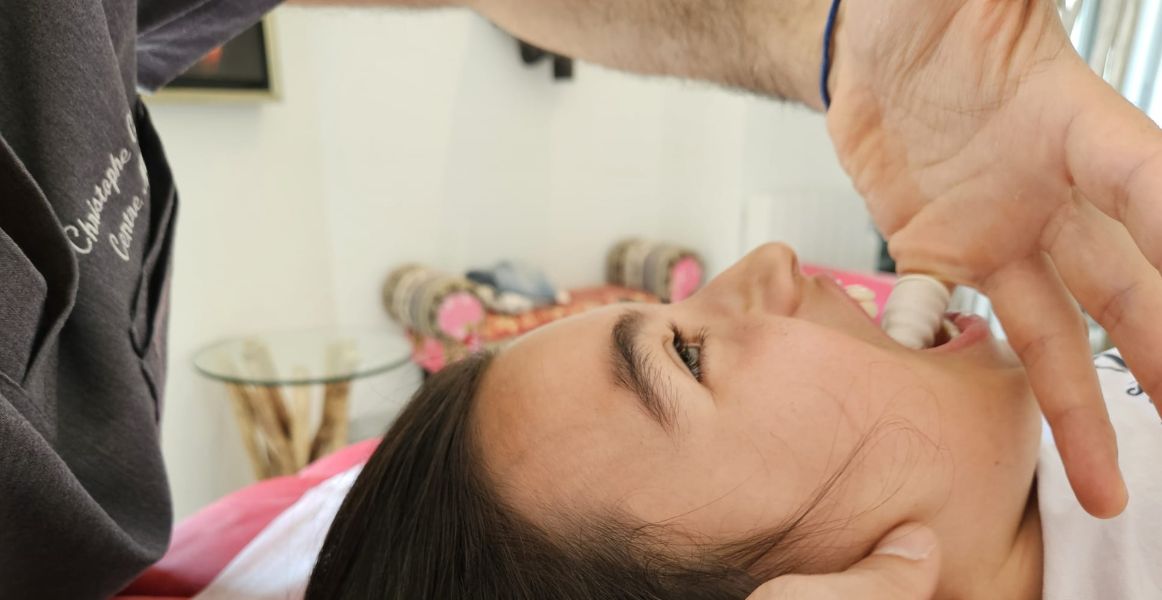- Home
- /
- Specific pathologies
- /
- Maxillofacial disorders
Maxillofacial, temporomandibular joint (TMJ ) or dental joint disorders are problems that affect the joints and muscles responsible for opening and closing the mouth. These TMJ disorders cause pain and functional difficulties.
Osteopathy plays a crucial role in assessing, treating and relieving these symptoms.
Our approach includes manual techniques, pain reduction, improved mobility, prevention of postural problems, and interprofessional collaboration when necessary, offering relief and a better quality of life for patients.
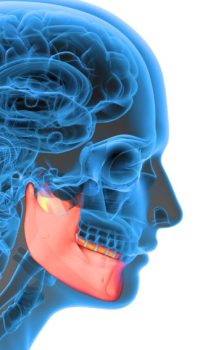
What causes maxillofacial disorders?
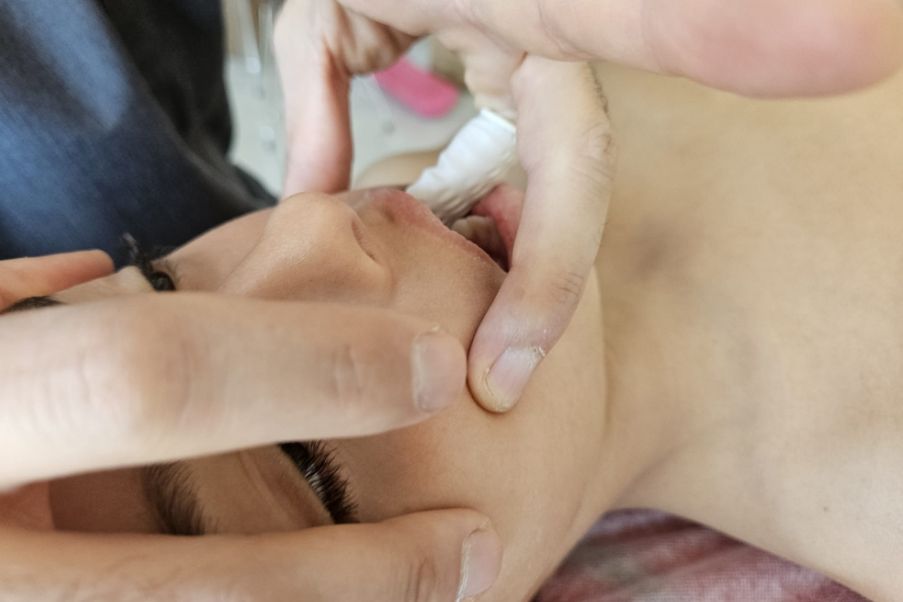
osteopathic approach and treatment
TMJ disorders can have a variety of causes, including stress, tooth clenching (bruxism), trauma, jaw deformity, arthritis or even congenital anatomical problems.
Accurate diagnosis of the underlying cause is essential for appropriate treatment.
What symptoms and functional problems can this cause?
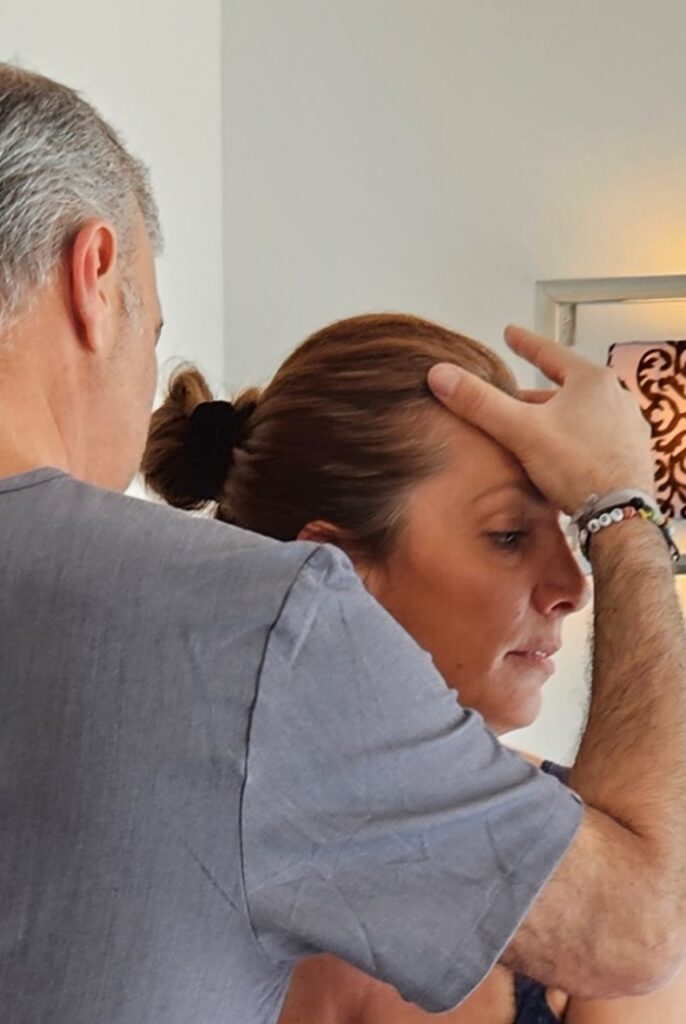
symptoms
the most common causes of pain
These disorders can lead to a variety of symptoms and functional problems, such as :
Facial pain
Pain can occur in the jaw, around the ear, in the temples, or even in the neck and shoulders.
Difficulty opening or closing the mouth
Some patients experience limited jaw mobility, which can make chewing, speaking and even opening the mouth difficult.
Crackling or clicking
When the joint functions abnormally, unusual noises such as crackling, clicking or popping may occur when opening or closing the mouth.
Headaches
TMJ disorders can be associated with headaches, often localized in the temple area.
Ear pain
Ear pain is common with these disorders, although it can often be mistaken for an ear infection.
Sensations of locking or deviation
Some people experience a sensation of locking or deviation of the jaw when opening or closing the mouth.
Dental pain
Dental pain with no apparent cause can be linked to TMJ disorders.
Have you already consulted your GP? Don't hesitate to contact us or book an appointment at our Centre Mozart surgery in Nice.
How to treat disorders?
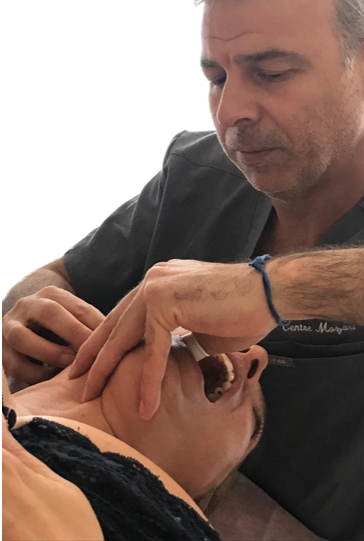
Care
the most common causes of pain
Treatment for TMJ disorders can be carried out by a variety of healthcare professionals, including dentists, orthodontists, osteopaths, or physiotherapists.
Treatment may include muscle strengthening exercises, osteopathic techniques to realign the joint, dental orthotics to reduce bruxism, and sometimes medication to relieve pain and inflammation.
If you suspect a TMJ disorder, it's essential to consult a healthcare professional for an accurate diagnosis and an appropriate treatment plan.
Early treatment can often help prevent worsening of symptoms and improve quality of life.
Have you already consulted your GP? Don't hesitate to contact or make an appointment at our practice Mozart Center in Nice
What role can the osteopath play in treatment?
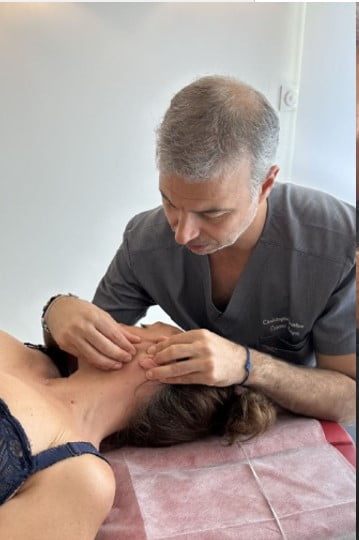
treatment
the most common causes of pain
The osteopath plays an essential role in the treatment of temporomandibular joint (TMJ) disorders, helping to relieve symptoms and reduce associated functional problems.
This role encompasses a variety of actions, including thorough assessment and diagnosis, using specific manual techniques to restore balance and mobility to the tissues involved in TMJ, reducing the pain associated with these disorders, improving jaw mobility, preventing postural problems, working interprofessionally with other health professionals when necessary, and providing advice and education to maintain better oral health and avoid harmful behaviors such as bruxism.
Have you already consulted your GP? Don't hesitate to contact or make an appointment at our practice Mozart Center in Nice
Let's discuss your treatment options
Every patient is unique, which is why I'm happy to discuss the various treatment options available to you.
I believe in a personalized approach to health, and my aim is to find the solution that best suits your situation.
Your health is my priority, and my team and I are here to help you regain your well-being.
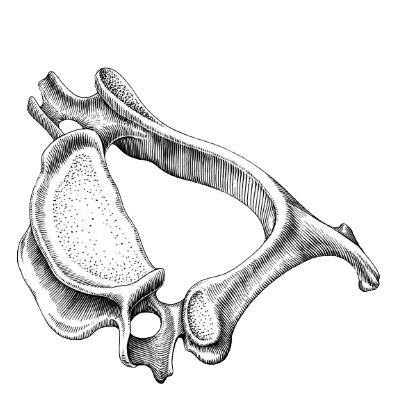
FAQs
The causes of TMJ disorders can be diverse, including stress, tooth clenching (bruxism), trauma, arthritis, dental occlusion disorders, and other factors.
Diagnosis of TMJ disorders usually involves a clinical examination by an oral health professional, such as a dentist or jaw specialist. X-rays, MRI or other medical imaging tests may be necessary to evaluate the joint.
Yes, stress and anxiety can contribute to TMJ disorders by increasing tooth clenching (bruxism) and causing excessive muscle tension in the jaw.
Yes, osteopathy can be beneficial for some patients with TMJ disorders. Osteopaths can work on the mobility and balance of the jaw and associated structures to relieve symptoms.



